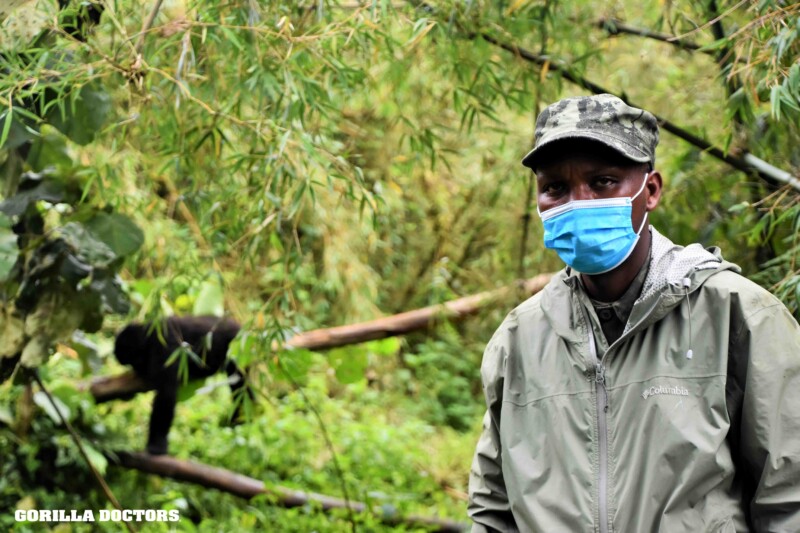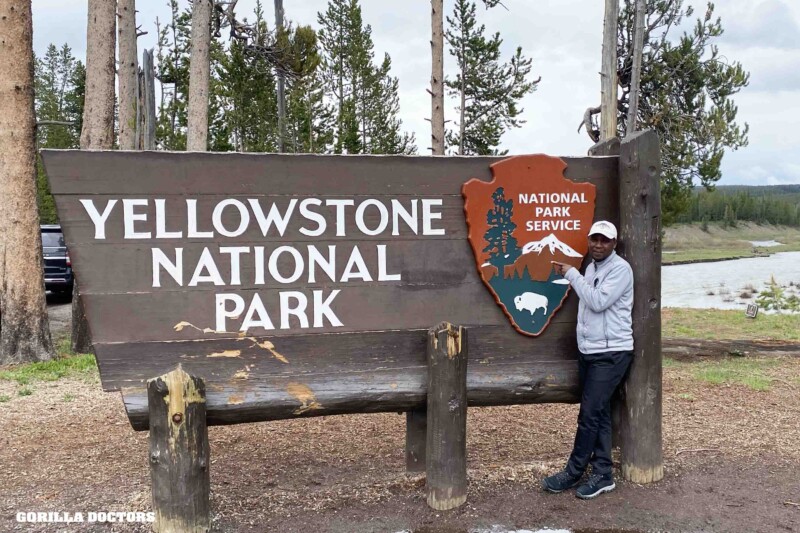Q&A: Dr. Noel Training in the USA
By Gorilla Doctors Staff on Wednesday, September 27th, 2023 in Blog.Noel, you’ve been with Gorilla Doctors for 14 years and you actually started out as laboratory a technician before becoming a field veterinarian. You just spent the past seven months at UC Davis studying pathology with Dr. Linda Lowenstine, one of the world’s leading experts in great ape pathology. Now you are continuing that training at Johns Hopkins University with Gorilla Doctors’ board member, Dr. Kathleen Gabrielson until the end of November. When you return to return to Rwanda you will be serving as our staff veterinary pathologist.
We are excited to learn more about your pathology training and time in the United States.

Dr. Noel conducts a health check on mountain gorillas in Volcanoes National Park, Rwanda. 2022. © Gorilla Doctors
FIRST! Watch this 40-second video of Dr. Noel describing some of his experience (and working alongside Dr. Linda Lowenstine) and then read this conversation we had with him before he left for Johns Hopkins in Baltimore, Maryland.
1) Can you tell us what is pathology and how does it help us keep gorillas healthy?
Pathology is the study of diseases. To keep gorillas healthy, we must understand the causes and origin of morbidity (suffering from disease) and mortality (death). Through the study and science of pathology we diagnose diseases by the examination of tissues and body fluids. This tool is critical for the success of Gorilla Doctors’ work because it helps us understand the types, interactions and impacts of diseases affecting the gorilla populations, particularly in the context of One Health. One Health recognizes that the health of gorillas, people, and the environments they share are interconnected. Diseases that impact people can also impact gorillas (and vice versa) so increasing our understanding of the diseases affecting gorillas can also inform and improve our understanding of disease in humans and other animals.
2) Can you give us an example of a time when you treated a gorilla and pathology helped either diagnose and/or inform treatment, either for that individual or in future cases?
Looking at the tissues and body fluids of deceased gorillas has helped us better manage similar cases when illness arises in living gorillas, increasing our chances for a positive outcome. In one case, a diagnosis of cellulitis (bacterial infection of the skin) in a silverback (adult male) mountain gorilla led us to the successful treatment of an adult female mountain gorilla six years later. This information also helps guide our research priorities. For example, the prevalence of gastritis (inflammation of the stomach lining) trigged extensive research on gorilla parasites across the gorilla landscape.
WATCH Dr. Noel administer medication via dart to a sick mountain gorilla in 2020 –
3) Besides what you are learning, what have been some of the highlights of your time in the US?
Well, every day of life, regardless of the circumstances, brings highlights. In fact, the learning process remains the number one highlight of my time here in the USA so far. But outside of my time on the microscope, reading books and attending pathology conferences, I have enjoyed visiting with friends and biking/walking through Davis. I had a wonderful experience at The Marine Mammal Center in Sausalito, CA and the California National Primate Research Center (CNPRC), where I had the opportunity to work with different veterinary pathologists examining samples on multi-headed microscopes and conducting rounds on necropsy floors.
One of my most fun experiences so far was driving through four states in one day (California, Nevada, Idaho, Wyoming), viewing the countryside, some wildlife along the road, learning about states’ nicknames, meeting amazing people in Jackson Hole, Wyoming, and finally visiting Yellowstone, the first national park in the United States and the world (established by President Grant in 1872).
4) Your U.S. training journey isn’t over yet! What are you going to be focusing on during your time at Johns Hopkins?
It is still about increasing my skills in the pathologic diagnosis of disease, but this time I will focus on comparative histopathology and learn advanced methods such as Immunohistochemistry, and all these new skills will help to start my new role when I return home.
Glossary of Terms
Comparative histopathology: The study of how disease processes in various tissues of the body manifest and differ across humans and other species.
Immunohistochemistry: The use of specific molecular “tags” that, when applied to a tissue sample, reveal the presence of pathogens in that tissue when examined by microscopy and other methods.


 Donate
Donate
